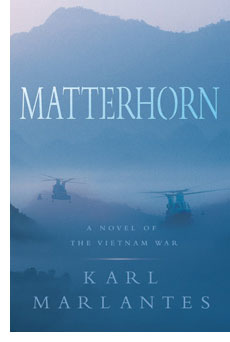 |
 |
 Karl Marlantes
Karl Marlantes
Matterhorn
Reviewed by: Rick Kleffel © 2010
El Léon Literary Arts / Atlantic Monthly
US Hardcover First Edition
ISBN 978-0-802-11928-5
Publication Date: 03-23-2010
600 Pages; $24.95
Date Reviewed: 03-08-2010
Index:
General Fiction
World-building is typically associated with science fiction and fantasy, where the settings of stories are partially or entirely imagined. But he technique is just as clearly required in historical novels as well. The nineteenth century is probably more unfamiliar to the 21st century read than any imagined future. Erik Larsen's 'Thunderstruck' is a great example of non-fiction, historical world-building.
But as we rocket forward in time, what we once thought of as "the present" — because many of us lived through it — becomes history, a world that needs to be built for us to see it again. In the hands of a great writer, world-building can become a powerful literary device. Karl Marlantes is clearly a great writer and his novel 'Matterhorn' (El Léon Literary Arts & Atlantic Monthly Press ; March 25, 2010 ; $24.95) builds for readers the world of the Vietnam War. It's alien, terrifying — and utterly real.
It's odd to think that readers of science fiction and fantasy may find 'Matterhorn' a lot more familiar than mainstream readers. They'll note the maps that head off the book, the command flow-chart, and the extensive glossary of unfamiliar terms in the back. All readers will appreciate them, because the world that Marlantes builds is indeed an unfamiliar, alien landscape. He doesn't cushion the blow, either. He drops you in the middle of the shit on page one and pretty much leaves you there for the next five hundred-plus pages. What speaks to his talent as a writer is Marlantes' ability to keep us riveted and willing to wallow, to wade through the river of despair.
The story is told primarily from the perspective of Waino Mellas, who is clearly a stand-in for Marlantes himself, who left Oxford in 1967 to enlist and fight in Vietnam. Mellas brings a literary voice to a gritty reality of leeches, filth and rampant disease. And it is through Mellas that we get a perspective on the racial as well as class tensions that permeated the men on the ground.
In 'Matterhorn,' Marlantes immerses readers in two worlds, really. The story unfolds in Vietnam, and everything that happens has the awful ring of truth. The lies, the wasted time, the wasted lives, the horrific rot of the jungle that creeps through everything, including the minds of those there. Marlantes puts the reader in Vietnam, and it is not a pretty place.
|
|
El Léon Literary Arts Edition |
But Marlantes is also giving us the perspectives of Americans in Vietnam. The men who fought this war found the surroundings then just alien as we do now. They've accommodated, to the degree that is was possible, and it changes them — in ways we the readers can perceive. Reading 'Matterhorn' is a schizophrenic experience, in many senses of the word. It's dualistic, to be sure. But it is also a descent into madness, or what looks to us in our not-so-comfortable 21st century environs as madness. We can see how once you plunge down, it becomes almost unimaginable that you can look up. Once you are immersed in the world, in the war — as Marlantes writes it — the possibilities beyond seem to taper of into the void.
Marlantes manages a huge cast, a complex scenario and the problems of world-building with complete ease. Our immersion in his well-plotted story is so complete that the literary underpinnings tend to go unnoticed. And he's admirably off-message here. It's clear that Marlantes is not writing a book with an eye towards converting readers to draw a particular conclusion about the general nature of the Vietnam War or, for that matter any war. Instead, 'Matterhorn' wants to put us in the boots of those fought this particular war in this particular place and time. All of them are now so distant as to be essentially unreachable. Ours is the alien planet. What was once the recognizable present has become an incomprehensible nightmare — one that replays, again and again. It's far better to read these nightmares than to dream them. Or live them.
|
 |
|
|
 |
| |
Review Archive
All Reviews alphabetized by author.
General Fiction
Non-Genre, general fiction and literature.
Horror
Supernatural fiction, supernatural horror and non-supernatural horror.
Science Fiction
Science fiction, science fantasy, speculative fiction, alternate history.
Fantasy
Fantasy, surrealism and magic realism.
Mystery
Crime, thrillers, mystery, suspense.
Non-Fiction
Non-Fiction, True Crime, Forteana, Reference.
Poetry
|
|
 |
|




